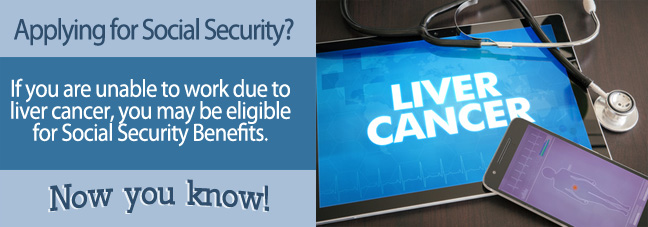Each year in the United States, approximately 42,220 people are diagnosed with liver cancer. Sadly, the incidence of liver cancer continues to rise and has more than tripled since 1980. While liver cancer survival rates have improved, only one in five individuals survives five years after diagnosis.
If you have been diagnosed with liver cancer, the chances are high that you will need to stop working. Most individuals with liver cancer qualify for Social Security Disability Insurance (SSDI) benefits. As the Social Security Administration (SSA) recognizes that age is a limiting factor in obtaining employment, your chances of being approved for disability benefits for your liver cancer if you are over the age of 50 are even higher.
Meeting a Blue Book Listing for Liver Cancer
The SSA maintains a medical guide called the Blue Book to determine what kinds of conditions and criteria are needed to be approved for disability benefits. Liver cancer is listed in section 13.19, Cancer of the Liver or Gall Bladder.
Due to the severity of liver cancer, nearly all individuals who apply for SSDI benefits will be approved for Disability benefits, provided that you have the documentation to verify your diagnosis.
In fact, liver cancer has such a poor prognosis that it is listed on the Social Security’s Compassionate Allowance program. This program allows for expedited application processing, as well as payment of benefits, to those individuals who are facing a severe or terminal illness, such as liver cancer.
Grid Rules and Liver Cancer
In the rare instance that you do not qualify for SSDI benefits for your liver cancer under the Blue Book listing, the Social Security Administration (SSA) will turn to the “grid rules.” The grid rules, sometimes referred to as the Medical-Vocational Allowance, take into account your age, educational level, past employment, and acquired skills to determine whether or not you are capable of working in your current job or another line of work.
Utilizing an evaluation called a Residual Functional Capacity (RFC) assessment, the SSA will determine what level of physical exertion that you are capable of performing. The classification that you are given on your RFC determines which grid will be used to evaluate your work capacity.
As a general rule, individuals who are older, less-educated, and possess few transferrable skills are more likely to be approved for SSDI benefits utilizing the grid-rules. The SSA believes that younger people with higher education can often find less strenuous jobs that they are able to perform despite their health conditions.

What Type of Work Can Someone with Liver Cancer Do?
While many people diagnosed with liver cancer are too ill to work, a cancer diagnosis does not mean that you need to leave your job. Some individuals with liver cancer choose to continue working as they feel it offers a distraction or helps them to maintain a sense of normalcy.
Someone with liver cancer would likely benefit from a low-impact and relatively stress-free job. Additionally, a position that allows for flexibility in hours and the ability to take time away from work would also be helpful. For example, it might be more manageable for someone with liver cancer to work as a telephone dispatcher than it would be to work as a plumber.
Should I Discuss My Case with a Disability Lawyer or Advocate?
Most individuals with liver cancer should have no difficulty obtaining Social Security Disability benefits provided that they have sufficient medical documentation demonstrating the presence of their liver cancer, as well as the severity and prognosis.
While you may be able to obtain SSDI benefits without the assistance of a lawyer, an experienced Social Security Attorney will likely be able to expedite the process for you. The SSA processes millions of Disability applications each year. A qualified Disability lawyer can ensure that your application is complete and prepared in a way so as to speed up the decision-making process.